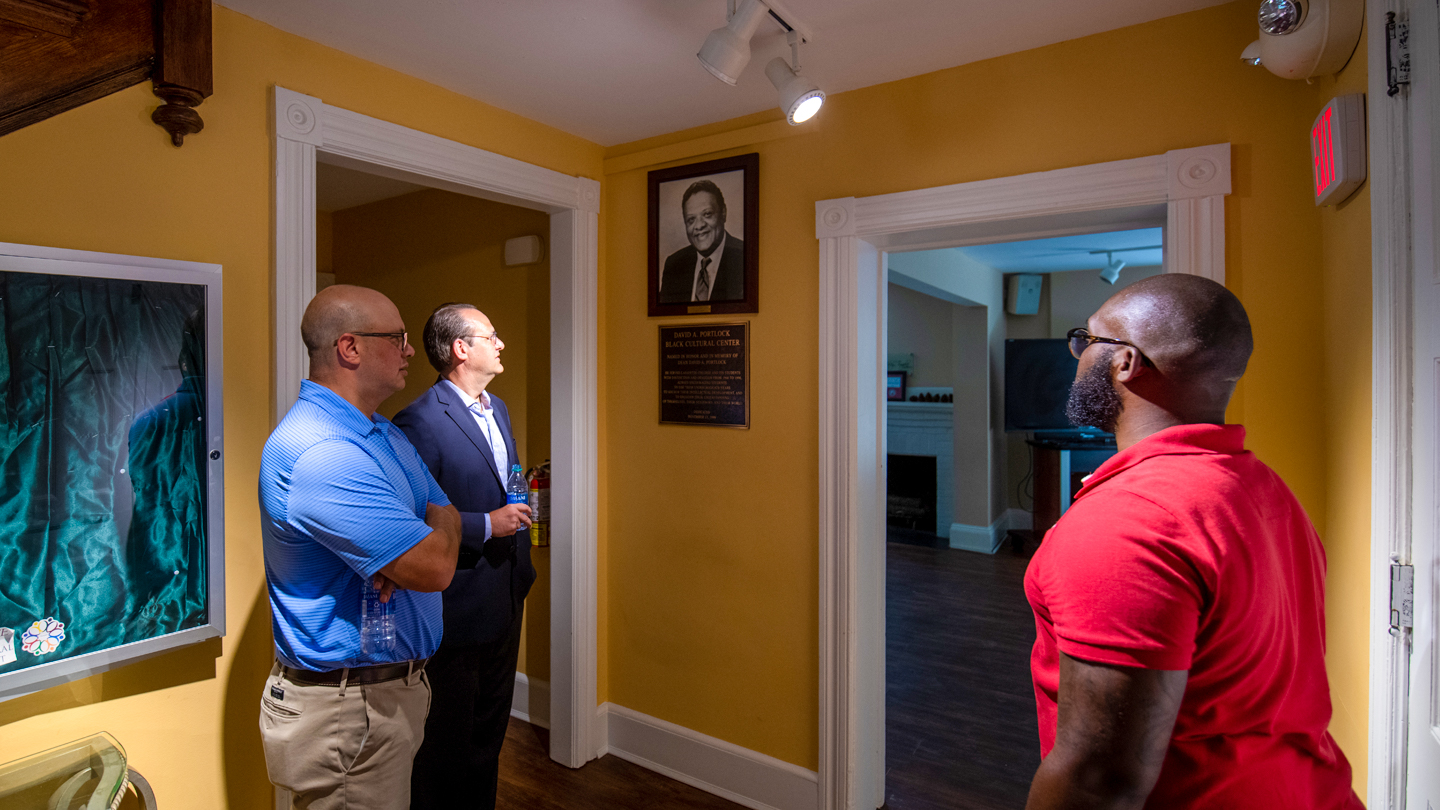A Special Homecoming
By Bryan Hay
For members of David A. Portlock’s family, Lafayette will always be a second home, a place to reminisce about how his bold leadership helped move the College toward a more inclusive and welcoming future.
But a recent campus visit by two of Portlock’s four children, Scott and Marc Portlock, took on a special meaning as they took in the construction activity two weeks before the successful Aug. 4 move of the new Portlock Center from 517 Clinton Terrace to its new location at 41 McCartney St. Before opening to students in spring 2022, the early-1900s stone house will undergo extensive renovations, giving it a full basement, wraparound porch, and space for housing and programming.
Accompanied by Rob Young ’14, director of intercultural development, Annette Diorio, vice president for campus life, and Jennifer Rock, assistant vice president of development and donor engagement, they also explored the old center at 101 McCartney St., which was named in honor of David A. Portlock in 1999.

A photo of Scott and Marc Portlock’s father, David A. Portlock, was originally displayed in the former Portlock Black Cultural Center. The photo will be moved to the new Center once complete. The Portlock brothers are pictured with Rob Young ’14, director of intercultural development during a recent campus visit.
Portlock first joined Lafayette in 1968 as a part-time consultant to the dean of students before becoming assistant dean of students in 1970 and assistant dean of academics in 1975.
He helped create several programs at Lafayette, including the Black Cultural Center and the campus Association of Black Collegians (ABC), whose original members still consider him a father figure. He also coordinated the study abroad program and was an adviser to student government and student-athletes. Before joining Lafayette in 1968, Portlock taught industrial arts in the Easton Area Joint School System.
Two of Portlock’s children are Lafayette alumni: Laura Portlock ’97, a financial services specialist living in Baltimore, and David Portlock ’88, a California-based screenwriter. Scott is a senior financial consultant and lives with his family in Texas; Marc P’24, an attorney, and his wife live in New Jersey; their son, Marc Jr. ’24, just completed his first year at Lafayette.
Before their campus tour in late July, Marc and Scott Portlock generously shared memories of their father, his Lafayette legacy, and what today’s students should know about him.
What do you think your father’s response would be to the beautiful stone house that will still bear his name as the new Portlock Center?
Marc: I certainly think he’d be very honored. He’d be proud and maybe a little surprised. I don’t think he was going about his work for recognition; he was doing it more for equality and community-building reasons. But he would be very touched by this and obviously proud.
Scott: He was definitely more of a behind-the-scenes type of guy, always leading by example. As Marc said, he pursued his work here to help a group of people find a home and find a voice in a comfortable setting. But I think he’d be surprised by the new house. He’d be happy and humbled to know that his legacy is alive and well at Lafayette, even after all of these years.
Marc, your son is carrying on the Portlock name as a student here at Lafayette. What’s his awareness of his grandfather’s legacy?
Marc: He never met his grandfather, but he certainly knows about his role here and that his work here made a difference. My wife and I enjoyed taking photos of him and his sister in front of the house on McCartney Street and sharing stories, so he’s well aware of what his grandfather did here. He has a sense of pride in that, and the stories he grew up with are very special to him.
What did your father say around the dinner table or in family conversations about his work at Lafayette?
Scott: Our dad talked about being guided and driven by a sense of just making sure he was doing the right thing and that people were treated fairly. That was paramount to him.
Marc: It was never about any one group or any one class of persons. He’d talk about ‘how do we make community here?’ He was very much about fairness, fairness for everyone. He would stress how important it was to make sure every student had the same opportunities.
If you had an opportunity to talk with current students, what would you want them to know about your father’s impact at Lafayette?
Marc: He was about serving students and making sure their voices were heard. And making sure they didn’t feel left out and that they had a place here on campus. He understood the importance of the ABC and the important role the Black Cultural Center played in providing a sense of community. But he also wanted to make sure that everyone was part of a larger community too. And if there was a way he could assist them, his doors were open.
He wasn’t afraid to tell kids exactly what they needed to hear and what they needed to do, or not do, to succeed at Lafayette. He told it straight, to us, too, and would warn if you mess up, it would not only hurt you but possibly others as well. It wasn’t always pleasant when you heard it. But he did it from a standpoint of caring and to make you think about perhaps unintended consequences of your actions.
Scott: I think it’s hard for kids today to understand what college life was like back then. It seems a whole lot different now. There are more programs, and there’s a sensitivity about so many things. But one thing we and our siblings know is our father’s value on creating a community and getting all groups to work together, to live together, and respect each other.